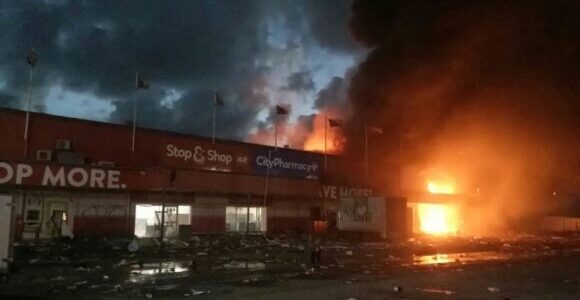The Marape government has imposed a 14-day State of Emergency in Papua New Guinea’s capital Port Moresby to maintain public order following extraordinary rioting and looting last week. Here’s what it means for business.

A CPL Group property on fire on 10 January. Credit: via POMCCI
The looting and public disorder across Port Moresby on 10 January followed a protest by police and public sector employees over wages, which escalated into violence as thousands of people took advantage of the temporary absence of law enforcement.
At a press conference the following day, Prime Minister Marape said several officials including the police commissioner had been suspended. He announced the appointment of Acting Police Commissioner Donald Yamasombi as Controller overseeing the emergency, and included him on a five-member committee led by Chief Secretary Ivan Pomaleu that will investigate the unrest.
A State of Emergency Centre has been established at Morauta Haus, Waigani, with a call centre and hotline set up for enquiries related to the emergency (tel: 1800500).
Public safety
More than 1,000 defence force personnel are on standby to help the police maintain law and order during the State of Emergency, which runs until 26 January. They have increased powers to detain and search anyone suspected of breaching the orders, according to a 13 January statement signed by Yamasombi.
“It will not be a harsh, strict lockdown,” Marape said at a press conference. “We want to keep our city operational. We want to keep our city functional. It is just for public safety.”
Security officials have the power to conduct routine searches of cars, public buses and other vehicles, including boats and marine vessels at sea. They can also search residences for weapons, and conduct pat-down searches of anyone suspected of breaching the rules. Alcohol can only be consumed in pubs, nightclubs or hotels until 10 p.m.
While no curfew has been imposed, the orders prohibit public gatherings, excluding churches and traditional “haus krai” mourning ceremonies. Vehicles transporting people to a suspected public gathering may be stopped and searched, according to the emergency orders.
Business response
“We need law and order restored, and it’s good that the army is out helping,’’ Rio Fiocco, President of the Port Moresby Chamber of Commerce and Industry, told Business Advantage PNG. “Things have calmed down in Port Moresby, and now the focus is on rebuilding.”
“There will be a massive rebuilding exercise needed … The government is going to have to come to the party and make priority allocations of FX available for those businesses that were affected”
At a meeting with government today, business organisations, superannuation funds and affected businesses pushed the government to provide emergency funds after shops, warehouses and gasoline stations were destroyed.
Total losses may rise to as high as K1.2 billion and won’t be recoverable under most insurance policies, Fiocco said.
“Businesses need immediate cash assistance,’’ he said. “Some of those businesses, if they don’t get compensation, will go to the wall.’’
Prime Minister Marape later announced an assistance package worth more than K300 million would be put in place to ‘help taxpayers that lost business.’ Details of the package are expected next week.
Business impact
The Investment Promotion Authority said one of its rented warehouses in Konedobu suffered fire damage, though it reassured businesses that any records or files that were destroyed are also stored online.
Companies including Steamships Trading Company, Kina Bank and Air Niugini shuttered operations nationwide after reports of sporadic looting outside the capital. In the logistics and business hub of Lae, violence threatened to escalate but was soon brought under control.
‘It was quelled by the disciplined combination of Lae Police, Army, Correctional Service officers and several major Security Companies…. all who are to be commended whilst under extreme duress and pressure, a reflection of the leadership of Lae Open Member Hon John Rosso and the men and women of the relevant Forces,” John Byrne, President of the Lae Chamber of Commerce, told Business Advantage PNG. “There is no need for a State of Emergency in Lae.’
Yamasombi, the Acting Police Commissioner, said in a 16 January statement that the commander of the NCD/Central Command has been suspended for 21 days, adding that it could be “the first of potentially several more suspensions” related to the conduct of police.
Businesses including banks and shops that closed in the wake of the violence have slowly reopened, Fiocco said. CPL Group, whose Stop & Shop stores were among the hardest hit, reopened most outlets on 12 January, but its shops in Badili, Rainbow and North Waigani were severely damaged, and its Harbour City store remains closed. It has temporary suspended trading on PNGX, PNG’s stock exchange, while it assesses the impact.
Recovery

POMCCI’s Rio Fiocco
John Pora, Chairman of the Small and Medium Enterprises Corporation, called on the Ministry of Commerce and Industry and other agencies “to urgently step up and engage in discussions to find solutions for the enterprises that have been badly affected”.
Fiocco says the business community will also urge the National Capital District Commission to fast-track approvals for re-construction projects and increase the amount of foreign exchange available in the country to support recovery efforts.
“There will be a massive rebuilding exercise needed, so that will be good for businesses in the construction industry and engineering,’’ Fiocco said. “The government is going to have to come to the party and make priority allocations of FX available for those businesses that were affected.”








Speak Your Mind